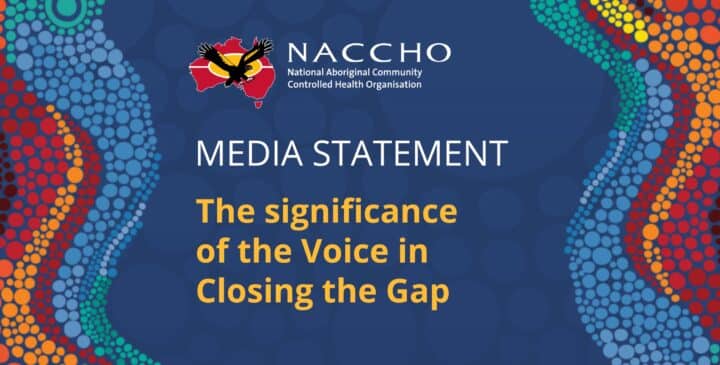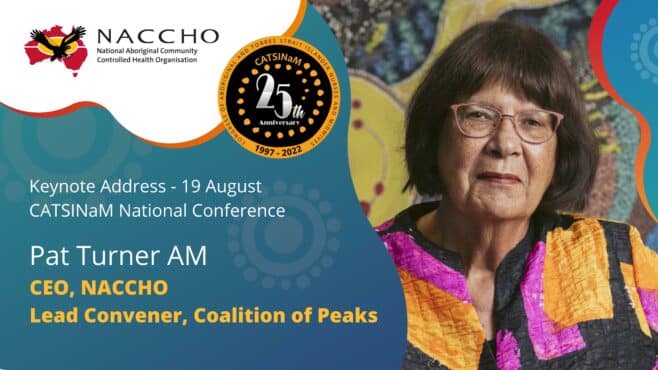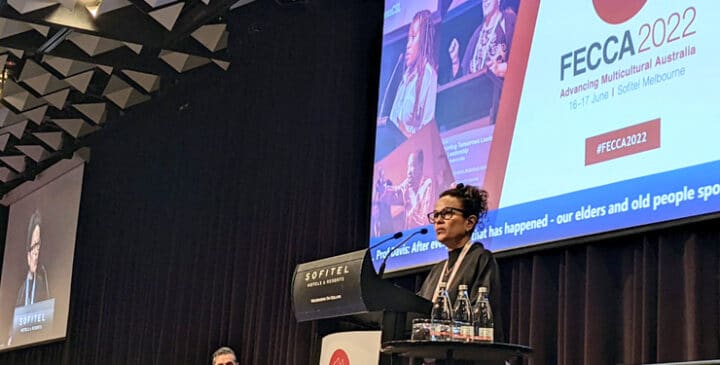

Ongoing commitment required to close the gap
“It’s good that there have been some positive gains already made in areas like child and maternal health.
“We are still a long way from Aboriginal and Torres Strait Islander people achieving the same health outcomes as other Australians,”
“That’s why it’s absolutely imperative that we continue to see commitments to programs and health care models that work – programs created by Aboriginal people, for Aboriginal people which involve them in their own health and support them to have brighter futures
NACCHO Chairperson, Matthew Cooke
The expansion of Aboriginal controlled primary health services and programs, the reduction of racism in the health system and investment in the Aboriginal health implementation plan are all key to improving the health outcomes of Aboriginal people now and for future generations.
NACCHO Chairperson, Matthew Cooke, marking 10 years since the launch of the Close the Gap campaign, said this Federal election year would be critical for all parties to reconfirm their commitment to the generational health of Aboriginal people.
“It’s good that there have been some positive gains already made in areas like child and maternal health.
“We are still a long way from Aboriginal and Torres Strait Islander people achieving the same health outcomes as other Australians,” Mr Cooke said.
“The recent Productivity Commission’s Report on the performance of the National Indigenous Reform Agreement has shown that investment in the mainstream organisations is not the answer.
“That’s why it’s absolutely imperative that we continue to see commitments to programs and health care models that work – programs created by Aboriginal people, for Aboriginal people which involve them in their own health and support them to have brighter futures.
The National Aboriginal Community Controlled Health Organisation (NACCHO) today supported the recommendations of the 2016 Close the Gap Progress and Priorities Report of the Close the Gap Steering Committee.
“Today’s report supports Aboriginal Community Controlled Health Services as the preferred model for primary health care and that’s because our Services work.”
Mr Cooke called for a range of measures which will help to close the health gap:
- Ongoing investment in, and expansion of, Aboriginal Community Controlled Health Services to deliver more care, in more areas, to more Aboriginal and Torres Strait Islander people;
- Funding for the Implementation Plan of the National Aboriginal and Torres Strait Islander Health Plan;
- Improvements in the delivery of medicines under the Close the Gap PBS co-payment measure;
- An improvement in patient coordination between hospitals and primary health care providers and
- Reworking of the IAS program with a view to ensuring programs that work continue to be supported including measures to reduce tobacco use, mums & bubs programs and other social and emotional wellbeing programs run through Aboriginal Community Controlled Health Services.
“Closing the Gap has enjoyed multi-party support for more than ten years and generational change doesn’t happen overnight.
“Now all levels of government need to step up and make sure we see even greater gains over the next ten years with continued commitment to engage with Aboriginal people and investment in their future.”
CTG Campaign Press Release
Close the Gap campaign calls for renewed commitment from all political parties
“Aboriginal Community Controlled Health Services should be the preferred model for investment as our own Aboriginal Health Services are best placed to deliver primary health care for Aboriginal and Torres Strait Islander peoples in all settings.”
Campaign Co-Chairs Mick Gooda and Dr Jackie Huggins
The Close the Gap Campaign has called on all political parties before the next federal election to renew their commitment to closing the unacceptable health and life expectancy gap between Aboriginal and Torres Strait Islander peoples and non-Indigenous Australians.
Campaign Co-Chairs Mick Gooda and Dr Jackie Huggins will today release the Close the Gap Progress and priorities report 2016 at a Federal Parliamentary Breakfast event in Canberra.
The report makes a number of recommendations including that each political party, prior to the next federal election, make Aboriginal and Torres Strait Islander health and wellbeing a major priority.
“This year, marks the tenth anniversary of the Close the Gap Campaign and ten years of hard work and achievement,” Mr Gooda said.
“We have seen some encouraging improvements over that time, but without concerted effort across governments and respectful engagement with Aboriginal and Torres Strait Islander peoples we as a nation will fail to close the gap.
“Health inequality has been a stain on our nation for far too long, but this generation has the opportunity to remove the stain and deliver health equality for Australia’s First peoples.”
Dr Huggins, who is also Co-Chair of the National Congress of Australia’s First Peoples, said improvements in some areas of Aboriginal and Torres Strait Islander health provided reason for optimism.
“We have seen improvements in the areas of infant and child health outcomes, the number of health checks being reported and better access to medicines,” Dr Huggins said.
“The long term impact of such improvements on adult health and life expectancy is yet to be seen as this will take time to measure. This should not be cause for complacency because the overall health of Aboriginal and Torres Strait Islander peoples still lags behind the rest of the nation.”
The report advises that due to lead times between the design and roll out of programs, measurable improvements to Aboriginal and Torres Strait Islander life expectancy should not be expected until at least 2018.
Mr Gooda, who is also the Aboriginal and Torres Strait Islander Social Justice Commissioner, said achieving the closing the gap targets within a generation would require a long term reform agenda.
“There is no quick fix for improving Aboriginal and Torres Strait Islander health and wellbeing. We need rock solid commitment with structures in place that will survive terms of government,” Commissioner Gooda said.
The Campaign Co-Chairs said the new Implementation Plan for the National Aboriginal and Torres Strait Islander Health Plan (2013–2023) provides government with an immediate opportunity to support closing the gap efforts.
“Funding of the Implementation Plan should be prioritised. We want to see core health service models and associated workforce and funding arrangements urgently developed, with particular focus on regions with relatively poor health and inadequate levels of service,” Dr Huggins said.
“Aboriginal Community Controlled Health Services should be the preferred model for investment as our own Aboriginal Health Services are best placed to deliver primary health care for Aboriginal and Torres Strait Islander peoples in all settings.”
The report also includes recommendations for an additional COAG Closing the Gap Target to reduce imprisonment rates; an increased focus on Aboriginal and Torres Strait Islander people with disability; a national inquiry into racism and institutional racism in health care; and reform of the Indigenous Advancement Strategy.

